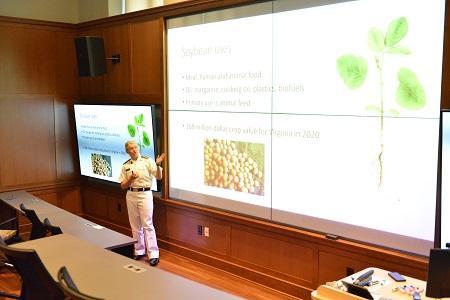Soybean Research at VMI


LEXINGTON, Va., April 5, 2022 — There are so many uses for soybeans. In fact, soybean yield was the subject of the senior thesis “Performance of Soybean Cultivars in Varying Rural Virginia Sites: Effect of Site Characteristics on Shoot Structure and Yield” presented by Rachael Dickenson ’22, during Honors Week at Virginia Military Institute, held March 21-31.
Not only is the crop used in many food products like tofu, edamame, soymilk, and soy sauce, it is also used as a high-protein animal feed. The oil from soybeans is used in margarine, cooking oil, and in biofuel applications. It is a $168 million crop in the state of Virginia alone.
Dickenson is the daughter of Glenn and Lisa Dickenson of Centreville, Virginia, and the granddaughter of Bill and Eileen Vandermeer of Ankeny, Iowa, Mary Dickenson of Warrenton, Virginia, and Walter Pennino of Fredricksburg, Virginia. She is double majoring in biology and civil engineering with a minor in Spanish. She said she chose to work on the soybean project because, “I believed it to be a balance of my two majors, with applications in biofuels and other engineering aspects.” However, she went on to joke, “though I was strongly discouraged from joining because of all the work involved.”
The soybean project was originally started in 2017 by previous cadets in the biology department and advised by Col. Anne Alerding. It involved planting nine different cultivars, which stands for “cultivated variety”, that is, different types within a species of plant, in two different sites within the state of Virginia. Those sites are Orange, north of Charlottesville, which has a more clayey soil, and Suffolk, which is closer to the coast and has a more sandy soil. Once the plants were harvested, it was the task of the cadets early in the project to remove the leaves, take photographs of them, dry the plants, and manually and painstakingly count and weigh each seed.
Dickenson joined the project, already in progress. She did not continue to do what had been done previously, but began a new phase of the project, involving computer science, statistical analysis, and image analysis. She wanted to find a way, using computer programming to speed up the process of assessing soybean yield and identifying the characteristics of the cultivars associated with an increased yield.
Dickenson was advised to consult with Dr. Aryeh Weiss, professor at Bar-Ilan University in Jerusalem, Israel, an expert in the computer program, Fiji (ImageJ). The two met weekly for nearly a year virtually. Dr. Weiss trained Dickenson in the software and mentored her throughout her research.
The conclusion reached by Dickenson was that soil was less important to the yield of the crop which she confessed, “was a bit of a surprise.” She discovered that the cultivar was more important. The work Dickenson performed will be labor saving for future studies in predicting pod to plant ratio yield.
Dickenson will graduate in May and be commissioned in the Army as an engineering officer.
Marianne Hause
Communications & Marketing
VIRGINIA MILITARY INSTITUTE
.svg)
.png)